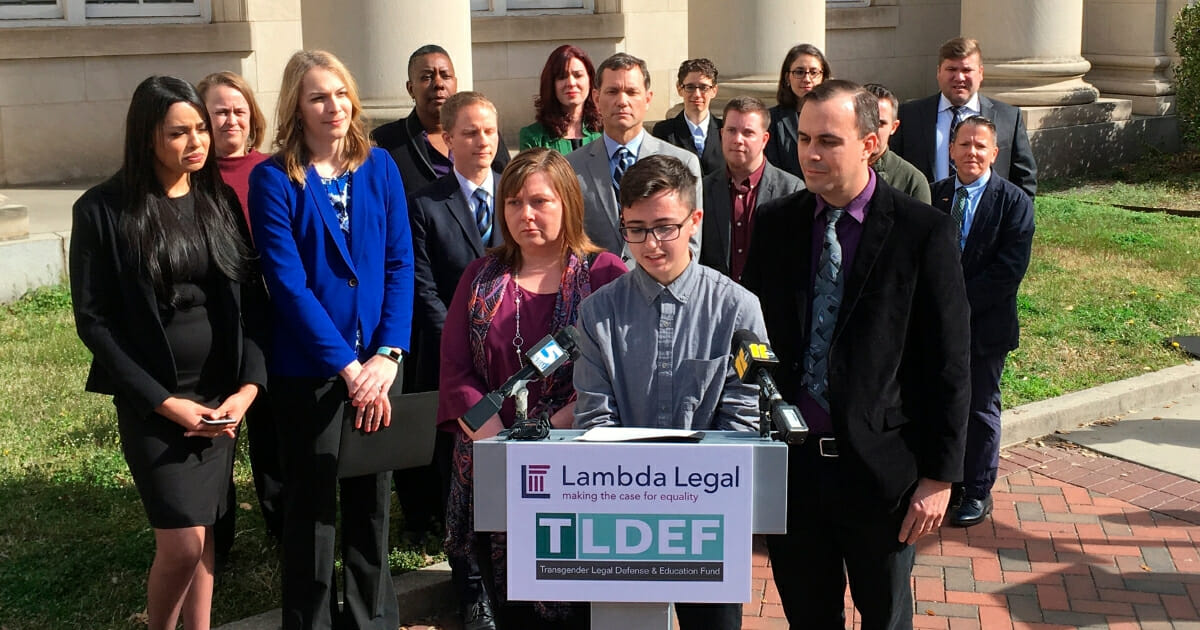
North Carolina Hit with Another Lawsuit over Transgender Rights
North Carolina is being sued again over its treatment of transgender people, as state employees argue that their health plan violated federal law by dropping coverage of medically necessary procedures.
The new lawsuit comes amid unresolved litigation over North Carolina’s so-called bathroom bill and the law that replaced it.
The lawsuit filed Monday argues the health plan for state employees violates federal health and education laws, as well as constitutional rights, by refusing to pay for hormone treatments and surgeries that it once covered. The treatments prescribed by doctors to treat gender dysphoria are described as life-saving by five current or former state employees, along with two transgender dependents, who are suing.
“We have to think of it like any medical condition that is treated by a doctor and is diagnosed,” said Taylor Brown, the Lambda Legal lawyer leading the case, who is a transgender woman. “To have to live in a world that perceives you, and that assigns you, as something that you’re not … It can make life unlivable for many people. And that’s why we see such high suicide rates in the transgender community.”
The state employee health plan, which provides benefits for approximately 720,000 people, had covered the transition procedures for transgender people for the year 2017. But the lawsuit said coverage was excluded from the plan for the years after that under Republican State Treasurer Dale Folwell, who took office in 2017.
A spokesman for Folwell, Frank Lester, said in an email that a previous treasurer had voted with the health plan’s board to cover the procedures for a year, but that no action was taken to extend the coverage under Folwell. Lester declined to comment further on the lawsuit, saying the office generally doesn’t discuss pending litigation.
The plaintiffs say the exclusion of coverage for transition-related treatments violates the federal Title IX education law, the constitution’s equal-protection clause and the federal Affordable Care Act.
“Transgender people are treated differently,” Brown said in an interview. “They’re not getting equal pay, in effect, for equal work.”
The Associated Press reviewed the lawsuit and was granted exclusive interviews with the plaintiffs before the litigation was announced at a news conference in Durham.
In similar cases, Lambda Legal sued Alaska on behalf of a legislative librarian and separately won a legal settlement for a New York county employee, both of whom were denied coverage for hormone therapy or surgery.
The North Carolina lawsuit comes amid a separate three-year legal fight over North Carolina’s 2016 “bathroom bill,” which in many public buildings required transgender people to use restrooms matching their birth certificates.
While that requirement was later rescinded, a replacement law halts new local antidiscrimination ordinances until 2020. Last year, a federal judge allowed a lawsuit to move forward challenging the replacement law’s moratorium on new local measures to protect LGBT residents.
Monday’s lawsuit is another sign of the difficulties still faced by transgender residents.
Among them is 16-year-old Connor Thonen-Fleck, whose family is saving for chest surgery to affirm his masculine identity that could cost more than $10,000 because it’s not covered by insurance for his parents, both state university employees.
“I think we’re mostly saved up now,” Connor said in an interview. “Obviously if we weren’t saving up, I would have had it way sooner.”
From an early age, Connor said he felt uncomfortable in the female gender assigned at birth, and by puberty a feeling of detachment from his own body settled in.
“I used to not be able to take showers very often because I couldn’t stand to look at this body,” he said.
He started seeing a therapist as a high school freshman and soon was diagnosed with gender dysphoria. Under medical supervision, he began socially transitioning to life as a male before starting hormone treatments. Because the health plan denies coverage for a testosterone prescription, his parents must pay out of pocket. Surgery to give him a more typical male chest would be the next step.
Still, his mother says, the treatment is “not optional for us,” and every expense has been worth it.
Remembering his Jan. 2, 2018, appointment with an endocrinologist to set the stage for his testosterone treatments, she said: “That may have been more of a special day than the day he was born. It was so wonderful to see him get what he needed.”
The Western Journal has reviewed this Associated Press story and may have altered it prior to publication to ensure that it meets our editorial standards.
Truth and Accuracy
We are committed to truth and accuracy in all of our journalism. Read our editorial standards.
Advertise with The Western Journal and reach millions of highly engaged readers, while supporting our work. Advertise Today.












